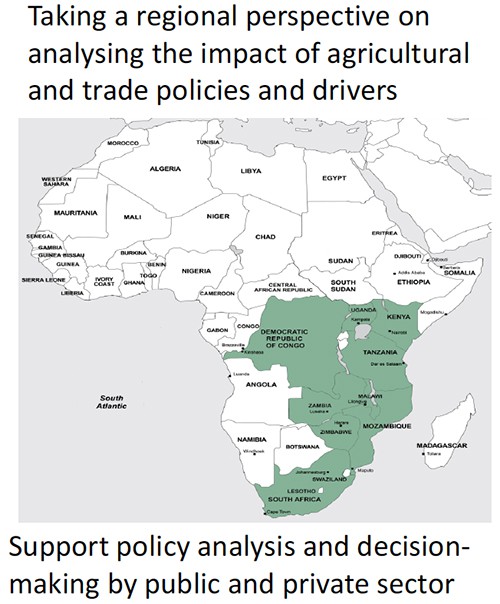Use of the ReNAPRI Partial Equilibrium Modelling for Policy Analysis and Crop Outlook Modelling
Ferdi Meyer. The ReNAPRI Partial-equilibrium initiative Training workshop – Malawi, September 25, 2017
By Dr. Flora Nankhuni, COP, NAPAS: Malawi
 A training on “Use of the ReNAPRI Partial Equilibrium Modelling for Policy Analysis and Crop Outlook Modelling” was conducted at the Center for Agricultural Research Development (CARD) at the Lilongwe University of Agriculture and Natural Resources (LUANAR) from 25th-29th September 2017 with support from the Feed the Future Innovation Lab for Food Security Policy (FSP) at Michigan State University, that is funded through USAID. Through the FSP, USAID has funded the Bureau for Food and Agricultural Policy (BFAP) under University of Pretoria, the Food and Agricultural Policy Research Institute (FAPRI) at University of Missouri and CARD at LUANAR to provide the training to Malawians. The training involved 18 trainees, (6 female) of which 8 were from the public sector, 5 from LUANAR. Malawi is the third country where the training has been provided. Sokoine University in Tanzania was the first to get the training followed by CEPPAG, a Policy Research Institute in Mozambique. The trainings are being done under the Regional Network of Agricultural Policy Research Institutes (ReNAPRI) that BFAP, CARD, Sokoine University, CEPPAG and five other research institutes in Africa, are part of.
A training on “Use of the ReNAPRI Partial Equilibrium Modelling for Policy Analysis and Crop Outlook Modelling” was conducted at the Center for Agricultural Research Development (CARD) at the Lilongwe University of Agriculture and Natural Resources (LUANAR) from 25th-29th September 2017 with support from the Feed the Future Innovation Lab for Food Security Policy (FSP) at Michigan State University, that is funded through USAID. Through the FSP, USAID has funded the Bureau for Food and Agricultural Policy (BFAP) under University of Pretoria, the Food and Agricultural Policy Research Institute (FAPRI) at University of Missouri and CARD at LUANAR to provide the training to Malawians. The training involved 18 trainees, (6 female) of which 8 were from the public sector, 5 from LUANAR. Malawi is the third country where the training has been provided. Sokoine University in Tanzania was the first to get the training followed by CEPPAG, a Policy Research Institute in Mozambique. The trainings are being done under the Regional Network of Agricultural Policy Research Institutes (ReNAPRI) that BFAP, CARD, Sokoine University, CEPPAG and five other research institutes in Africa, are part of.
Dr. Richard Kachule and Dr Julius Mangasoni from CARD, Professor Ferdi Meyer, Director of BFAP, Tracy Davids, researcher of BFAP and Professor Julian Binfield, researcher of FAPRI delivered the training. CARD has already developed a Partial Equilibrium model for the maize industry in Malawi. The aim of this training is to enable CARD and a larger number of policy analysists in Malawi to develop Partial Equilibrium crop models for other commodities beyond maize and to expand and strengthen capacity for CARD to use the ReNAPRI Partial Equilibrium Modelling initiative for policy analysis and market outlook projections in national and regional contexts to inform policy makers. Some of the ways in which these models have been used for policy include: predicting impacts of the 2015/16 drought on staple maize markets in Eastern and Southern Africa; modelling the impact of discretionary trade policies on the Zambian maize market; and assessing the socio-economic impact of the sugar tax on the South African sugar industry.
PowerPoint Presentation:
The ReNAPRI Partial-equilibrium Initiative Training Workshop – Malawi
Prof. Ferdi Meyer
ReNAPRI – BFAP, South Africa
NAPAS presentation at ReNAPRI PE Training
Flora Nankhuni, PhD
NAPAS: Malawi Chief of Party
In the media:
Experts trained on partial equilibrium, MBC, October 11, 2017



 Print
Print Email
Email
